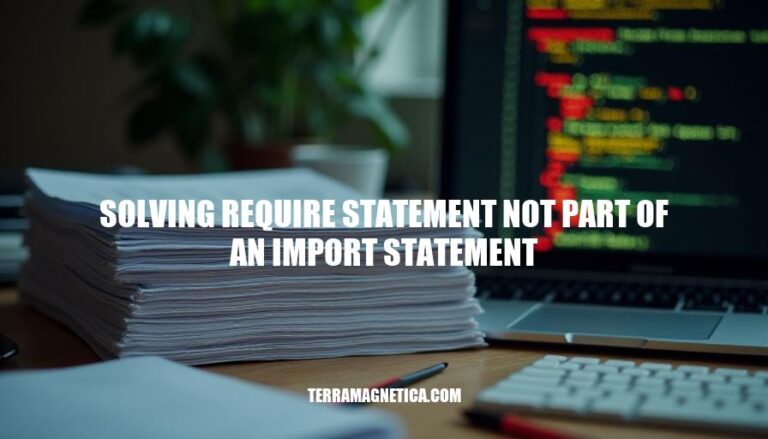


The error “require statement not part of an import statement” typically occurs when using the require function outside of an import statement in JavaScript or TypeScript. This issue arises because modern JavaScript (ES6 and beyond) and TypeScript prefer the import syntax for module loading, which is more consistent and easier to statically analyze.
In contemporary development, adhering to the import syntax ensures better compatibility and maintainability of code, especially when using tools like ESLint to enforce coding standards. This shift is crucial for leveraging modern features and maintaining clean, modular codebases.
The error “require statement not part of an import statement” is flagged by ESLint due to the use of require() in a way that doesn’t conform to modern ES module syntax. Here are the technical reasons and details:
import and export statements. This syntax is statically analyzable, meaning tools like ESLint can parse and understand the module structure without executing the code.require() is part of the CommonJS module system, which is synchronous and used primarily in Node.js. ES modules, on the other hand, are asynchronous and designed to work natively in browsers and other environments.require() calls are dynamic and can make static analysis difficult.JavaScript: Uses import and export for ES modules. For example:
import { myFunction } from './myModule.js';
export const myVariable = 42;
CommonJS syntax with require() is still supported in Node.js:
const myModule = require('./myModule');
module.exports = myVariable;
TypeScript: Supports both ES modules and CommonJS. TypeScript will compile ES module syntax to the appropriate module system based on the module setting in tsconfig.json. For example:
import { myFunction } from './myModule';
export const myVariable: number = 42;
TypeScript can also use require() but it’s discouraged in favor of ES module syntax.
import and export is considered a best practice as it aligns with the modern JavaScript standard and allows for better optimization and tooling support.@typescript-eslint/no-var-requires specifically disallows the use of require() statements outside of import statements to encourage the use of ES module syntax.By adhering to these rules, developers can ensure their code is more maintainable, optimized, and compatible with modern JavaScript standards.
Developers often encounter the “require statement not part of an import statement” error in the following scenarios:
Using require in TypeScript files:
// ❌ Incorrect
const foo = require('foo');
Using require in ES6 modules:
// ❌ Incorrect
const bar = require('bar');
Using require in a mixed module environment:
// ❌ Incorrect
import something from 'something';
const anotherThing = require('another-thing');
These examples trigger the error because require statements are not allowed outside of import statements in ES6 and TypeScript environments.
Here are various methods to solve the “require statement not part of an import statement” error:
require Statements to import Statementsrequire statement:const moduleName = require('module-name');
import statement:import moduleName from 'module-name';
require statement:const moduleName = require('module-name');
import:const moduleName = await import('module-name');
require statement:/* eslint-disable @typescript-eslint/no-var-requires */
const moduleName = require('module-name');
/* eslint-enable @typescript-eslint/no-var-requires */
/* eslint-disable @typescript-eslint/no-var-requires */
.eslintrc.js file:module.exports = {
rules: {
'@typescript-eslint/no-var-requires': 'off',
},
};
These methods should help you resolve the error effectively.
To avoid the ‘require statement not part of an import statement’ error and maintain clean, error-free code when using module imports, follow these best practices:
Use ES6 Import Syntax: Prefer using import over require for consistency and compatibility with modern JavaScript standards.
// Correct
import moduleName from 'module-name';
Consistent Module Paths: Ensure module paths are accurate and consistent. Use relative paths where necessary and avoid typos.
// Correct
import utils from './utils';
Configure ESLint: Use ESLint with the @typescript-eslint/no-var-requires rule to catch improper use of require.
// .eslintrc.js
module.exports = {
rules: {
'@typescript-eslint/no-var-requires': 'error',
},
};
Avoid Mixing Syntaxes: Stick to one module system (preferably ES6) to avoid conflicts and confusion.
// Avoid mixing
import foo from 'foo';
const bar = require('bar'); // Incorrect
Use TypeScript: TypeScript enforces module syntax and helps catch errors early.
// TypeScript
import foo from 'foo';
Self-Executing Functions: If you must use require, wrap it in a self-executing function to avoid scope issues.
(function() {
const utils = require('./utils');
// Use utils here...
})();
Project-Level Configuration: Configure your project to handle specific cases where require is necessary.
// .eslintrc.js
module.exports = {
rules: {
'@typescript-eslint/no-var-requires': 'off',
},
};
By following these practices, you can maintain clean and error-free code in your projects. Happy coding!
Follow these key points:
By understanding and addressing this error, you can maintain clean and efficient code in your projects.